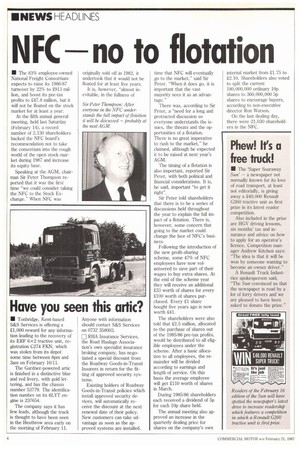NFC--no to flotation
Page 8

If you've noticed an error in this article please click here to report it so we can fix it.
• The 83% employee-owned National Freight Consortium expects to raise its 1986/87 turnover by 22% to £913 million, and boost its pre-tax profits to £47.8 million, but it will not be floated on the stock market for at least a year.
At the fifth annual general meeting, held last Saturday (February 14), a record number of 2,130 shareholders backed the NFC board's recommendation not to take the consortium into the rough world of the open stock market during 1987 and increase its equity base.
Speaking at the AGM, chairman Sir Peter Thompson reported that it was the first time "we could consider taking the NFC to the Stock Exchange." When NFC was originally sold off in 1982, it undertook that it would not be floated for at least five years.
It is, however, "almost inevitable, in the fullness of Sir Peter Thompson: After everyone in the NFC understands the full impact of flotation it will be discussed — probably at the next AGM. time that NFC will eventually go to the market," said Sir Peter. "When it does go, it is important that the vast majority sees it as an advantage."
There was, according to Sir Peter, a "need for a long and protracted discussion so everyone understands the issues, the threats and the opportunities of a flotation. There is no great imperative to rush to the market," he claimed, although he expected it to be raised at next year's AGM.
The timing of a flotation is also important, reported Sir Peter, with both political and financial considerations. It is, he said, important "to get it right".
Sir Peter told shareholders that there is to be a series of discussions held throughout the year to explain the full impact of a flotation. There is, however, some concern that going to the market could change the face of NFC's business.
Following the introduction of the new profit-sharing scheme, some 47% of NFC employees have now volunteered to save part of their wages to buy extra shares. At the end of the scheme year they will receive an additional £33 worth of shares for every £100 worth of shares purchased. Every £1 share bought five years ago is now worth £41.
The shareholders were also told that £2.5 million, allocated to the purchase of shares out of the 1985/86 pre-tax profits, would be distributed to all eligible employees under the scheme. After a basic allocation to all employees, the remainder will be divided according to earnings and length of service. On this basis the average employee will get £110 worth of shares in March.
During 1985/86 shareholders each received a dividend of 5p for each 10p share held.
The annual meeting also approved an increase in the quarterly dealing price for shares on the company's own internal market from £1.75 to £2.10. Shareholders also voted to split the current 180,000,000 ordinary 10p shares to 360,000,000 5p shares to encourage buyers, according to non-executive director Ron Watson.
On the last dealing day, there were 21,030 shareholders in the NFC.












































































